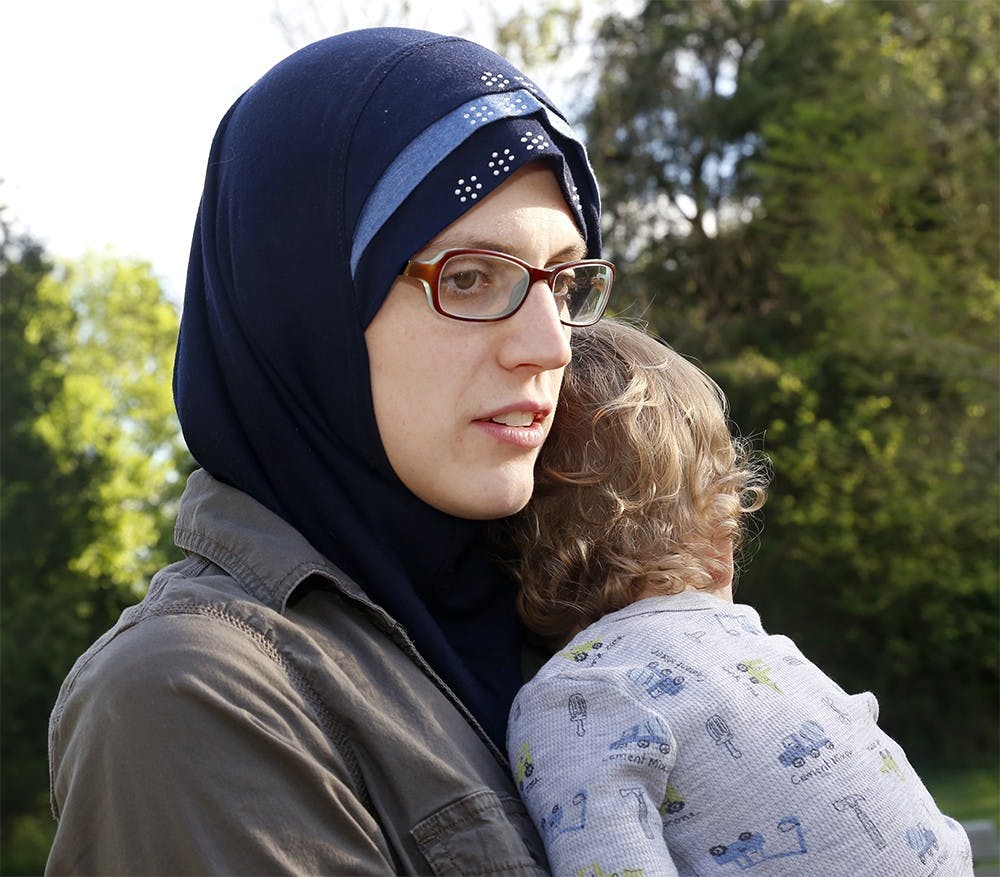When Anna Maidi thinks about her life, she realizes it is split into two very distinct times. Her transition from the previous life to the new one is culminated around one clear moment.
It starts with a goofy 19-year-old, the Hoosier Café in Read residence hall and a bottle of juice.
The 19-year-old was Chabane Maidi, Anna’s now-husband. Hoosier Café is where they met in 2006 when Anna was 18 and a freshman at IU. The bottle of juice is what he was carrying when he changed her life.
The memory is so vivid to Anna because Chabane influenced her to convert to Islam during a time when the religion was heavily stigmatized in the United States, especially after the Sept. 11 attacks.
She wasn’t religious.
She believed in God, she said. She believed He existed, but that was as far as her beliefs extended.
Chabane was a devout Muslim, however. Anna said she saw how strongly he felt about his religion and the Quran, so she tried to read it for him.
As a college student, Anna didn’t particularly have time to read the holy book from cover to cover as she had intended. Then she was offered an internship in France in 2009.
While she was there, she began to read more often and said she found the truth. She officially converted during her last week before coming back to the United States.
She didn’t tell Chabane when she returned — not right away.
“I wanted it to be just me and God for a minute,” she said. “When I told Chabane, I knew it would be ours, and I wanted it to be mine for just a little while.”
After marrying, Chabane and Anna had two children. One is 3 years old, and the other is 20 months old.
“I see more beauty in the world,” Anna said. “I feel as if I’m more myself than I ever could have been.”
Anna made a slow transition to Islam, she said. Her subtle alterations, she said, shielded her from major forms of discrimination.
One choice she did make that wasn’t subtle was the decision to wear a hijab and is something she has to think about on daily basis, she said.
Anna said at this point she hardly looks in the mirror when she leaves her home, but she is consciously aware of stares when she covers her head with her hijab.
“Uncovered, I go about my business,” Anna said. “When I am covered, I see people staring at me, and I have to wonder, ‘Do they hate me?’ Sometimes when someone approaches you, you get worried.”
So few things were important to Anna before meeting Chabane, she said. However, one thing that was important to her was her family, who were open and supportive of her conversion, she said.
Her family, she said, always raised her to be open-minded. She said they were raised Christian but are not devoutly religious anymore.
Some of Anna’s friends from high school asked her questions about her conversion such as ‘What does that mean?’ or ‘What exactly do you believe in now?’ They didn’t do this in an accusatory way, but just out of curiosity, she said.
After she explained her reasons and beliefs to them, they understood and were accepting, she said.
While her friends expressed acceptance, not everyone in the country is as open-minded — Anna said it depends on the person.
There are four types of people, Anna said.
The first are the people who act as allies to Muslims, she said, and they realize Muslims in America are Americans. They realize it’s not even a bubble, but they are just like everybody else, she said.
The second group of people, she said, are those who don’t know exactly how they feel but are worried because of what they have seen in the media.
Third are those who hate Muslims blindly without ever looking into their real beliefs, she said.
Finally, the most dangerous group, she said, are those who hate Muslims because they think they are educated on who Muslims are.
“They made themselves experts on hating Muslims, and that’s why it’s important to get to know Muslims, not Islam,” Anna said. “Meeting a Muslim will tell you a lot more about who we are than reading the Quran.”
Anna was 14 on Sept. 11. 2001, and she was busy taking her ISTEP exams, so she didn’t find out until after she was finished. Because she was so young, she said she didn’t understand the political issues with what happened.
She said it was a horrible tragedy, and now that she’s older and understands the world more, she has noticed an otherization of Muslims since then. But because she was so young, she said Islamaphobia went over her head.
Now, Anna reads the Quran, serves on the executive board at the local Islamic center and types Insha’Allah, which means God willing, at the end of many emails and texts.
She is also married, is a college graduate, has two kids, spends time with her family and goes to the park with her children.
“I’m a real grown up now,” she said. “I have kids. That’s part of me being a Muslim, making these choices that have stuck with me. I thank God all the time that I found Chabane, because without him, where would I be?”






